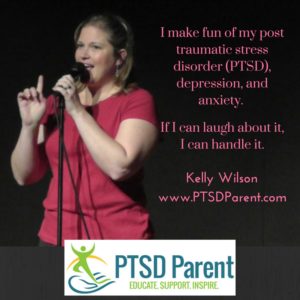 I regularly perform stand up comedy as part of my mental health. I make fun of my post traumatic stress disorder (PTSD), depression, and anxiety. If I can laugh about it, I can handle it.
I regularly perform stand up comedy as part of my mental health. I make fun of my post traumatic stress disorder (PTSD), depression, and anxiety. If I can laugh about it, I can handle it.
People often ask me if I’m nervous before a performance. I reply, “My counselor and I prefer to call it ‘excited.'”
Why? As far as I know, the physiological reactions in the human body are the same whether your brain names a feeling as “excitement,” “nervousness,” “anxiety,” or “fear.” This is an important distinction for someone with PTSD, as my whole life has become about managing emotions and brain chemistry.
When I compare the terror of performing stand up comedy to the scariest roller coaster you’ve ever been on, the next question is, “Then why do you do it?”
Well, because I love it. And it has gotten easier with practice.
Since I have a couple of stand up or speaking gigs a month, I have also noticed a certain pattern when it comes to a looming performance. These stages can last from a couple of minutes to days or weeks, it really just depends on the situation.
1. “Who, me?”
This is the flattery and feeling of being honored to even be asked to speak or perform. It is accompanied by excitement and the mad dash to check the calendar and make sure I’m available.
2. “Wait…what am I doing?”
The logistics have all been set up, the date of the event is on the calendar, and I am awash with insecurity. I haven’t done this for very long, I’m not that good at it, I don’t know what I’m doing, What if I’m not funny?
3. “Wa-hoooo!”
This is the excitement stage. The insecurity hasn’t gone away totally, but I have punched it in the junk, shoved it in a closet and have now decided to be at least a little excited.
4. “Hey, Everybody, Guess What!”
It’s time to promote! Details for the event take over the calendar, the blog, the Facebook, the Twitter, the everything. The insecurity tries to convince me that nobody will actually show up, or if they do, they will refuse to laugh.
5. “Wait, I need to talk about something.”
I channel that insecure harpy into creating content, as it occurs to me that I actually need to come up with a set list. About two weeks before an event, I start going through my raggedy notebooks and note cards, watching previous videos and thinking through what might work and what won’t in my allotted time. I try out different versions of jokes on anyone who will listen and compare responses. I write and rip up countless note cards.
6. “This comedy isn’t working!”
It’s time to cut the jokes that I just don’t like or think won’t work – if I don’t even like it and can’t sell it, then why would anyone laugh at it?
7. “I hope nobody is looking through my window and seeing this.”
The rehearsal stage is when I appreciate curtains and blinds the most. I use a shake weight as a microphone and rehearse my set over and over and over again so that it becomes like muscle memory.

8. “Agh, leave me alone!”
The mind-numbing terror has set in and has decided to make out with the insecurity – I hope they don’t get pregnant. There is not enough room for all of the voices in my head at this point, so I really want people to not talk to me. This is incredibly difficult when trying to raise a family, have friends, work, or simply leave the house to participate in the world.
9. “I’m just talking to myself.”
I begin muttering, going through my set wherever I happen to be. People think I am talking to them but I AM NOT. Please don’t interrupt, I AM REHEARSING.
10. “I can’t believe I agreed to do this.”
This stage happens about 2 to 5 minutes before stepping on the stage. Pacing or hopping backstage, my brain starts to spin faster than a toddler in a grocery store, and I am convinced that I will forget everything I have prepared and will simultaneously pee my pants and throw up.
11. “That was awesome! When can I do it again? Where is the wine and cheeseburger?”
Let’s face it, there hasn’t been a whole lot of eating before a performance. Bring on the burger!
For your entertainment, here is a recent video of my mental health jokes at Portland Center Stage:
About PTSD Parent
We’re glad you found us! PTSD Parent educates, supports, and inspires all people living with Post Traumatic Stress Disorder in their homes and families. At PTSD Parent, you can find helpful resources if you are a parent with PTSD, if you have a child with PTSD, and if you are a friend or family member of a loved one with this diagnosis. You can find out more about PTSD Parent and go here to sign up for email updates!